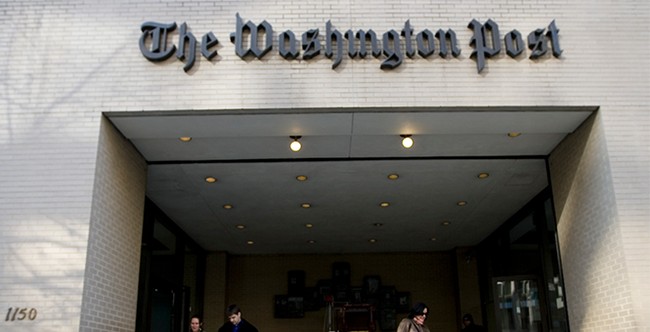
Recently declassified FBI documents have exposed a troubling revelation about one of the Washington Post’s Pulitzer Prize-winning stories on Russian collusion. The documents show that FBI officials were aware the story contained false information, yet the newspaper was still awarded journalism’s highest honor.
According to newly released records, in June 2017, former NSA Director Admiral Mike Rogers told FBI agents and a member of Mueller’s team that a Washington Post story from May 2017—claiming Trump asked intelligence officials to push back on the FBI’s Russia probe—was inaccurate. It’s unclear whether the Post knew Rogers disputed their report before publishing it, but Rogers made it clear to investigators shortly afterward that the story was false.
The Post story — now known to have been directly refuted by one of its main subjects the month after it published — would go on to be among the Russiagate stories published by the outlet to win a Pulitzer Prize in 2018. Trump is currently suing the Pulitzer Board for defamation for continuing to defend the awards it gave to this collusion-related story and numerous others. A Florida circuit court judge denied the Pulitzer Board’s motion to delay President Donald Trump’s defamation lawsuit against them on presidential immunity grounds.
The newly-released Rogers interview with the Mueller team shows that the then-NSA director was read a quote from The Washington Post article — that “President Trump urged [Rogers] to publicly deny the existence of any evidence of collusion during the 2016 election” — with the FBI notes stating that “Rogers responded that the media characterization was wrong, and the President had asked about the existence of SIGINT [signals intelligence] evidence only.”
The Rogers interview was among hundreds of pages of Crossfire Hurricane documents declassified by President Trump and sent to Congress by FBI Director Kash Patel.
One of the story’s authors, Ellen Nakashima, has been noted for her consistent coverage of intelligence community matters throughout the Russiagate period. Neither the Washington Post nor the Pulitzer Prize Board responded to requests for comment about these revelations, which add significant weight to Trump’s ongoing defamation lawsuit against the Pulitzer Board.
Recommended: Say What? CNN Claims Only the Right Has an ‘Extremism Problem’
This disclosure represents another in a growing list of “conspiracy theories” that have been validated through subsequent document releases and investigations. The episode highlights ongoing concerns about media accuracy and accountability, particularly regarding coverage of political figures and their interactions with intelligence agencies.
The Rogers interview was part of a larger cache of Crossfire Hurricane documents that were recently declassified. These materials continue to shed new light on one of the most contentious periods in recent American political history, challenging many of the mainstream media’s long-held narratives about Russian collusion.
The silence from the Washington Post and the Pulitzer Board isn’t just deafening—it’s disgraceful. Their blatant refusal to even acknowledge the mounting evidence undermining the Pulitzer-winning story is a huge journalistic scandal. This isn’t just about one story—it’s about the total collapse of credibility in elite media institutions that once claimed to uphold truth. As more damning documents surface, the façade is cracking, and it’s becoming impossible to ignore the ugly truth: Some of the most “celebrated” journalism of our time was built on a foundation of lies.
The mainstream media won’t admit their Russian collusion stories were built on lies—even with FBI documents proving it. We’re not afraid to tell the truth and expose media corruption. Join PJ Media VIP today using code FIGHT for 60% off and help us continue uncovering what they don’t want you to know.







